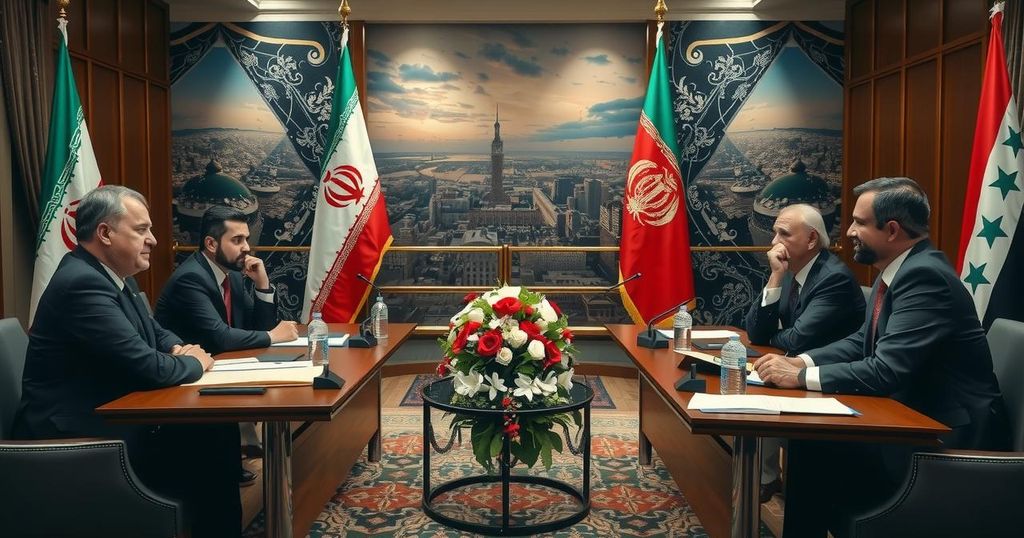Iran’s Ali Asghar Khaji met a Syrian delegation in Astana, marking the 22nd round of talks aimed at stabilizing Syria amidst regional tensions. Discussions focused on strengthening Iran-Syria relations and addressing aggressions from Israel while considering Iran’s evolving ties with Iraq and Saudi Arabia, including an invitation for a visit to Tehran.
The Iranian Foreign Ministry’s senior adviser, Ali Asghar Khaji, engaged in discussions with a Syrian delegation in Astana, Kazakhstan. This interaction is part of a sustained six-year initiative involving Iran, Russia, and Turkey, aimed at discussing Syria’s future amidst the ongoing complexities in the region. With the Syrian regime consolidating its influence in western Syria, both Russia and Iran are urging a reconciliation between Turkey and the Assad government. Iran has underscored the importance of these talks, despite the uncertain commitment from Russia and Turkey towards the Astana process. During the discussions, Iranian officials focused on issues regarding “confronting the crimes of the Zionist regime and preventing the spread of tension to the entire region.” This meeting marked the 22nd session of the Astana talks, as reported by the Iranian state news agency IRNA. Additionally, Iran and Syria utilized the opportunity to discuss extensive regional developments and the persistent aggressions by Israel. The chief negotiator from the Syrian side reiterated the enduring strategic partnership between Syria and Iran, emphasizing the need for expanding bilateral relations. Furthermore, Iran aims to leverage these conversations alongside diplomatic engagements with Iraqi and Saudi officials to reinforce their stance against Israel. Moreover, during a meeting in Riyadh, Iranian Vice-President Mohammad Reza Aref extended an invitation for the Saudi Crown Prince Mohammed bin Salman to visit Tehran, underscoring the progress in reconciling Iranian-Saudi relations in recent years. Aref remarked, “There is no doubt that the benefits of this deepening of relations will not only include Iran and Saudi Arabia, but certainly, considering the characteristics and impacts of the two big countries on the region and the Islamic world, this will lead to the development of regional cooperation and solidarity among Islamic nations,” as stated by IRNA. In another significant development, reports indicate that Iraq intends to organize an Arab summit in May to address various regional issues, aiming to bolster Iran’s connections with Arab nations while criticizing Israel. This aligns with Iran’s ongoing strategy of utilizing Iraq as a logistical base for its militias, who are positioned to conduct operations against Israeli targets.
The article examines the dynamics of international diplomatic efforts concerning Syria, particularly through the framework of the Astana process involving Iran, Russia, and Turkey. Established in 2017, this dialogue seeks to resolve the protracted Syrian civil war that began in 2011, characterized by complex alliances and rivalries. Iran’s recent engagements highlight its commitment to regional influence and partnerships, particularly with Syria, against the backdrop of persistent tensions with Israel and evolving relations with Saudi Arabia and Iraq.
In conclusion, the discussions in Astana signify Iran’s continued diplomatic efforts to fortify its alliances in the region and emphasize a coordinated response to what it perceives as regional threats, particularly from Israel. The Astana talks reflect ongoing geopolitical complexities, where Iran seeks to leverage its relationships with Syria and broader Arab nations. Furthermore, the invitation extended to Saudi Arabia reflects a significant thaw in relations that could reshape regional dynamics. Overall, these developments suggest a concerted effort by Iran to consolidate its influence in the Middle East.
Original Source: www.jpost.com






